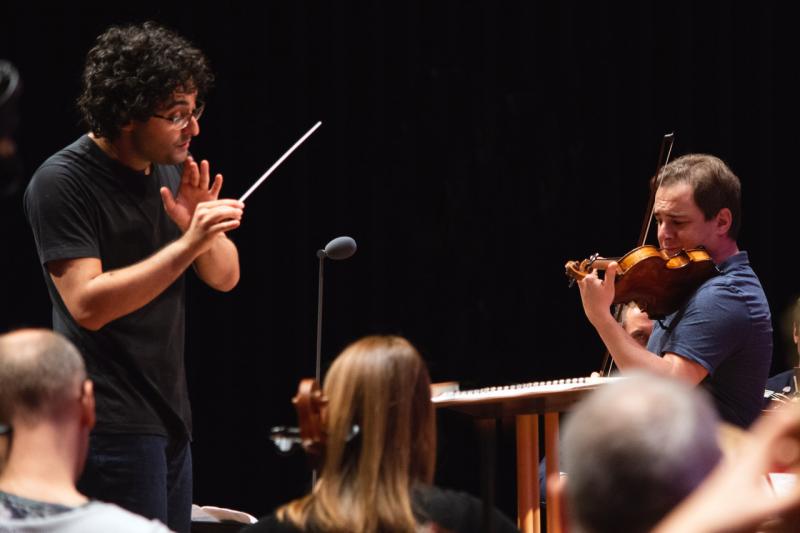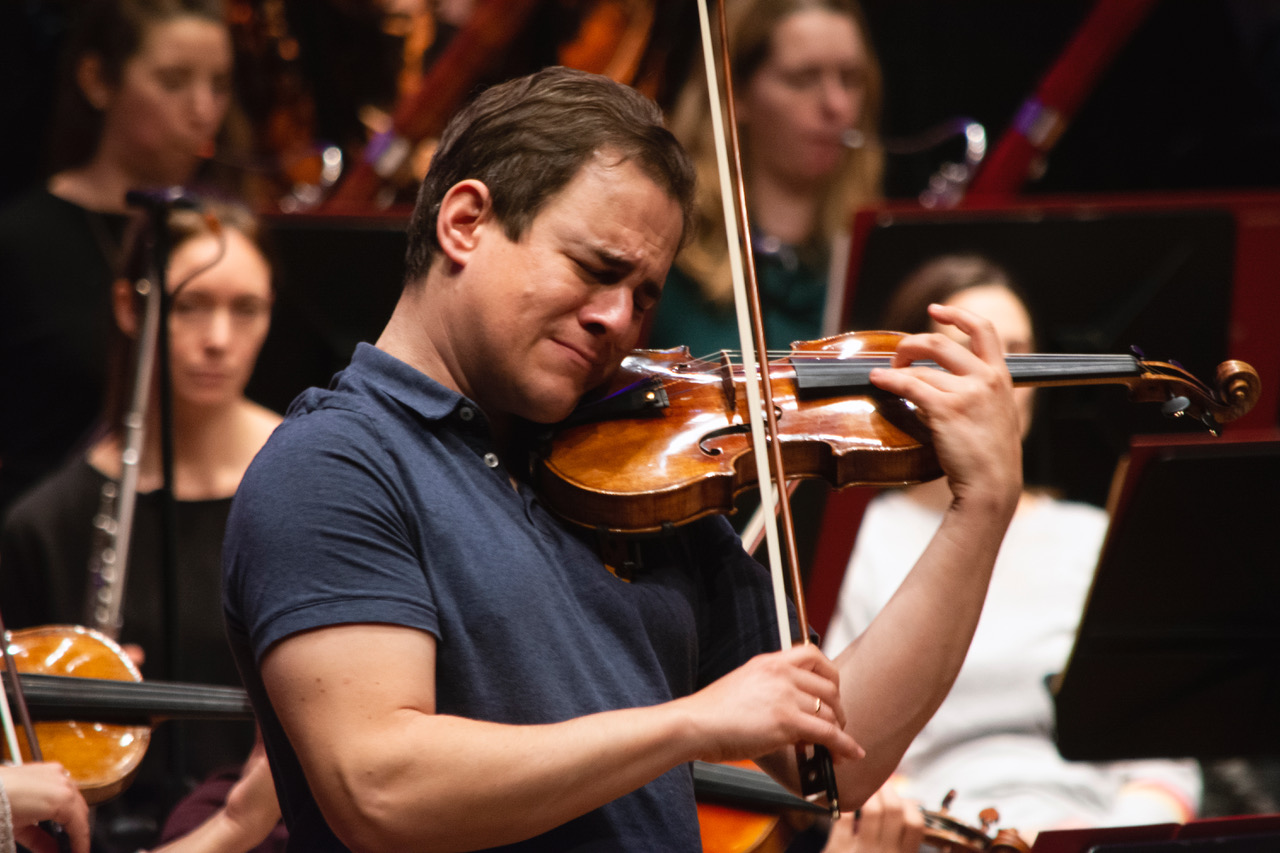Liebeck, Bournemouth SO, Hasan, Lighthouse, Poole review - evergreen gifts of melody | reviews, news & interviews
Liebeck, Bournemouth SO, Hasan, Lighthouse, Poole review - evergreen gifts of melody
Liebeck, Bournemouth SO, Hasan, Lighthouse, Poole review - evergreen gifts of melody
Popular classics freshly minted in the hands of young talent

Having conducted two Discovery programmes with the LSO after being a finalist in the 2016 Donatella Flick competition, London-born Kerem Hasan went on to win the Nestlé and Salzburg Festival Young Conductors Award in 2017.
The conductor’s astute choice of works for his debut with the BSO matched three highly contrasted and very personal pieces all underpinned by significant autobiographical stimulus and deep-rooted nostalgia. Kodály’s Dances of Galánta made for an unexpectedly generous opener. Conductor and orchestra hit the ground in step, clearly relishing their ethnic folksiness, with all the wind section principals, especially clarinet, encouraged to savour their solos with idiomatic freedom and flexibility before taking the audience with them to cumulative knees-up abandon in the closing fast dances. Composed in 1933, 10 years later than Bartók’s Dance Suite, Kodály’s set has less bite and variety than his close friend and compatriot's, but still tugs at the heartstrings with an endearing empathy for people of the land in times past, colourfully and riotously realised in this performance.
Max Bruch’s evergreen First Violin Concerto then potentially allowed collective heartbeats to subside into one of the repertoire’s most visited supposed comfort zones. No point in going into detail - from the orchestra’s brief opening invitation to the soloist to engage with them and speak from the soul, collective hearts and minds were instantly engaged by playing of freshly-minted expressive depth and intensity, free of any sentimentality or showmanship. Jack Liebeck’s vocal pliancy of phrasing, tonal shading and expressive trenchancy offered a conversation piece with conductor, orchestra and audience alike at every turn (the violinist pictured below). It was as though the work was being played for the first time.  We’ve all been starved of this live, intuitive level of communicative musical chemistry for far too long. As if this wasn’t enough, our soloist chose the Malincolia movement from Ysaye’s Sonata No.2 for solo violin to underline the point with a brief, but apposite encore. The audience remained rapt, almost oblivious of the amazing finger-twisting multiple stopping supporting the melody. Both of Liebeck’s performances were spellbinding and a rare privilege to experience.
We’ve all been starved of this live, intuitive level of communicative musical chemistry for far too long. As if this wasn’t enough, our soloist chose the Malincolia movement from Ysaye’s Sonata No.2 for solo violin to underline the point with a brief, but apposite encore. The audience remained rapt, almost oblivious of the amazing finger-twisting multiple stopping supporting the melody. Both of Liebeck’s performances were spellbinding and a rare privilege to experience.
After a much-needed interval, the trajectory from Hungarian gypsy band music via High German Romanticism took us to the autobiographical baring of a Russian composer’s soul in Tchaikovsky’s Fifth Symphony. The composer’s four movement sequence of life, love and dancing contentment beset by intrusions of Fate transformed to a rousing and victorious finale came freighted with well-shaped drama and clarity of vision. The opening movement’s interplay between moods sombre and striving was sharply characterised. The compelling intensity of the second movement’s journey of desperation to emotional collapse was well realised with the composer’s ‘con alcuna licenza’ but without histrionic overkill. The third movement sported malevolent stopped horns as ghosts at the haunted ballroom pointedly poisoning the waltz to conjure a delicious vision of the composer’s demons dancing with barely disguised Mendelssohnian fairies. The finale triumphantly raised the roof, saving max exhilaration for the closing pages.
Hasan’s rapport with the orchestra augurs well, both in concert and in the opera house. On this hearing of his Tchaikovsky, dance companies should be queuing up to engage him for the three great ballets and much else.
Finally, the BSO deserves a plaudit for their supplementary online promotional activity that supports and enriches all their concerts. Their Livestream presentation offers high quality production values for sound and vision with live commentary from the hall, often by distinguished radio presenters. This is supplemented in advance on their website by detailed talks with music examples examining the works performed on each programme. Forget any thoughts of Bournemouth being provincial. This level of quality output and enterprise leaves many other professional musical enterprises in the shade.
rating
Explore topics
Share this article
The future of Arts Journalism
You can stop theartsdesk.com closing!
We urgently need financing to survive. Our fundraising drive has thus far raised £49,000 but we need to reach £100,000 or we will be forced to close. Please contribute here: https://gofund.me/c3f6033d
And if you can forward this information to anyone who might assist, we’d be grateful.

Subscribe to theartsdesk.com
Thank you for continuing to read our work on theartsdesk.com. For unlimited access to every article in its entirety, including our archive of more than 15,000 pieces, we're asking for £5 per month or £40 per year. We feel it's a very good deal, and hope you do too.
To take a subscription now simply click here.
And if you're looking for that extra gift for a friend or family member, why not treat them to a theartsdesk.com gift subscription?
more Classical music
 Gesualdo Passione, Les Arts Florissants, Amala Dior Company, Barbican review - inspired collaboration excavates the music's humanity
At times it was like watching an anarchic religious procession
Gesualdo Passione, Les Arts Florissants, Amala Dior Company, Barbican review - inspired collaboration excavates the music's humanity
At times it was like watching an anarchic religious procession
 Classical CDs: Camels, concrete and cabaret
An influential American composer's 90th birthday box, plus British piano concertos and a father-and-son duo
Classical CDs: Camels, concrete and cabaret
An influential American composer's 90th birthday box, plus British piano concertos and a father-and-son duo
 Cockerham, Manchester Camerata, Sheen, Martin Harris Centre, Manchester review - re-enacting the dawn of modernism
Two UK premieres added to three miniatures from a seminal event of January 1914
Cockerham, Manchester Camerata, Sheen, Martin Harris Centre, Manchester review - re-enacting the dawn of modernism
Two UK premieres added to three miniatures from a seminal event of January 1914
 Kempf, Brno Philharmonic, Davies, Bridgewater Hall, Manchester review - European tradition meets American jazz
Bouncing Czechs enjoy their Gershwin and Brubeck alongside Janáček and Dvořák
Kempf, Brno Philharmonic, Davies, Bridgewater Hall, Manchester review - European tradition meets American jazz
Bouncing Czechs enjoy their Gershwin and Brubeck alongside Janáček and Dvořák
 Solomon, OAE, Butt, QEH review - daft Biblical whitewashing with great choruses
Even a top soprano and mezzo can’t make this Handel paean wholly convincing
Solomon, OAE, Butt, QEH review - daft Biblical whitewashing with great choruses
Even a top soprano and mezzo can’t make this Handel paean wholly convincing
 Two-Piano Gala, Kings Place review - shining constellations
London Piano Festival curators and illustrious friends entertain and enlighten
Two-Piano Gala, Kings Place review - shining constellations
London Piano Festival curators and illustrious friends entertain and enlighten
 Echo Vocal Ensemble, Latto, Union Chapel review - eclectic choral programme garlanded with dance
Beautiful singing at the heart of an imaginative and stylistically varied concert
Echo Vocal Ensemble, Latto, Union Chapel review - eclectic choral programme garlanded with dance
Beautiful singing at the heart of an imaginative and stylistically varied concert
 Scott, Irish Baroque Orchestra, Whelan, RIAM, Dublin review - towards a Mozart masterpiece
Characteristic joy and enlightenment from this team, but a valveless horn brings problems
Scott, Irish Baroque Orchestra, Whelan, RIAM, Dublin review - towards a Mozart masterpiece
Characteristic joy and enlightenment from this team, but a valveless horn brings problems
 Classical CDs: Voice flutes, flugelhorns and froth
Baroque sonatas, English orchestral music and an emotionally-charged vocal recital
Classical CDs: Voice flutes, flugelhorns and froth
Baroque sonatas, English orchestral music and an emotionally-charged vocal recital
 Kanneh-Mason, Britten Sinfonia, Shave, Milton Court - a grin and a big beaming smile
A pair of striking contemporary pieces alongside two old favourites
Kanneh-Mason, Britten Sinfonia, Shave, Milton Court - a grin and a big beaming smile
A pair of striking contemporary pieces alongside two old favourites

Add comment